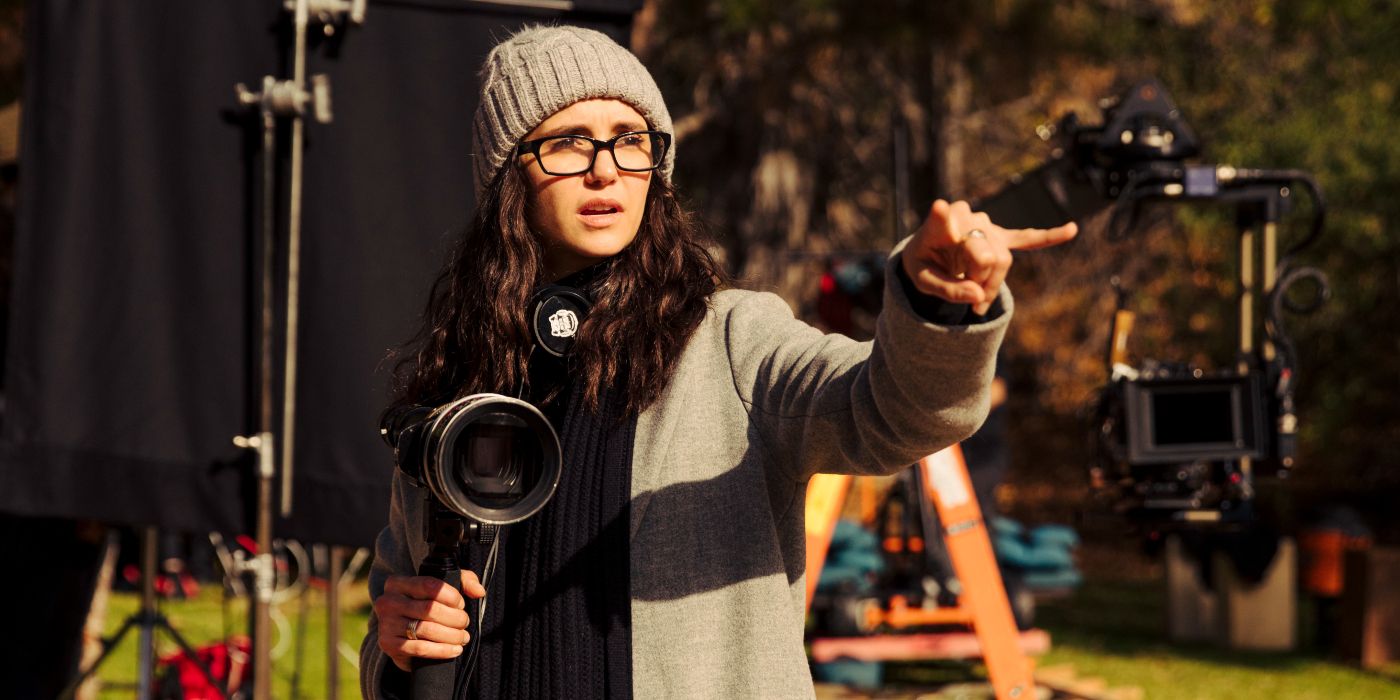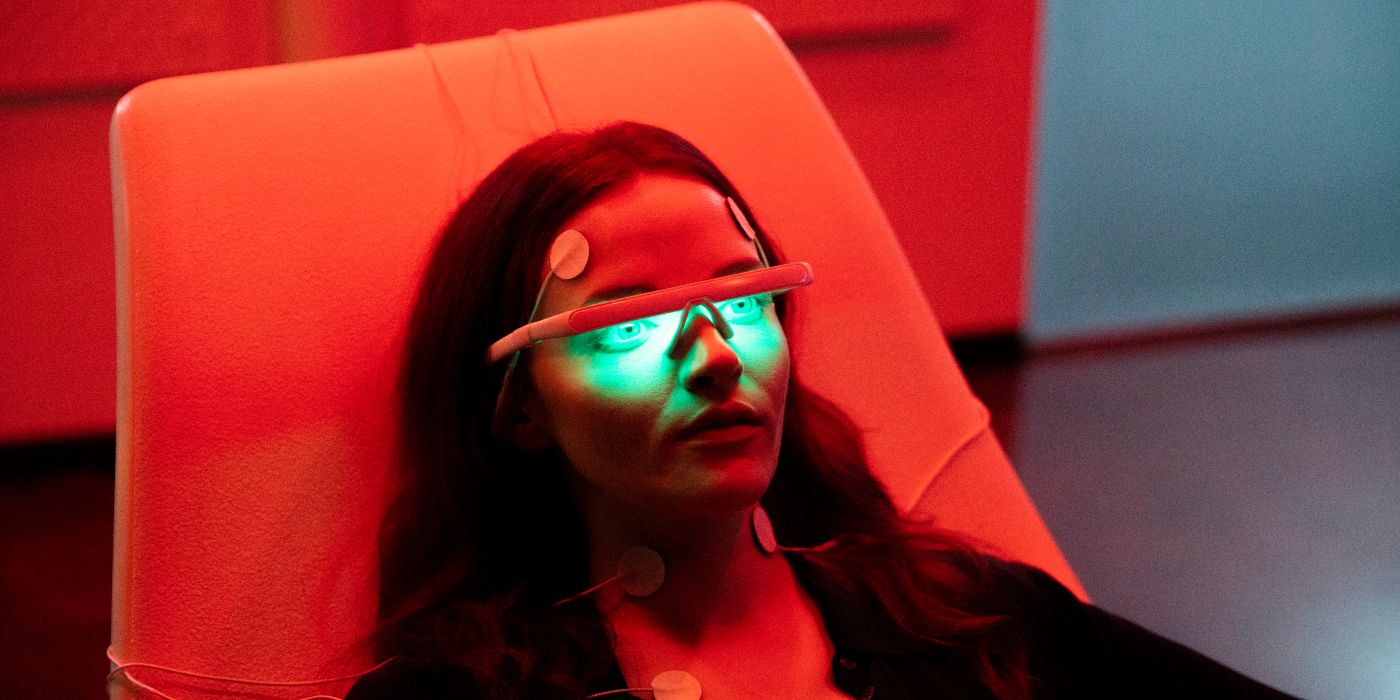Best known for playing Elena Gilbert and Katherine Pierce on The Vampire Diaries, Nina Dobrev steps behind the camera to direct her first short film, The One. A high-concept psychological thriller about playing God through technology, The One stars Madeline Brewer (The Handmaid's Tale), Indya Moore, Ryan Kiera Armstrong, and Summer Fontana. The One premieres at the SCAD Savannah Film Festival on October 28, 2021.
Screen Rant spoke with the talented writer-director Nina Dobrev in an in-depth interview about her real-life inspirations behind The One, her influences as a director, working with Euphoria's director of cinematography Drew Daniels, and her goals to expand her short film into a feature or a limited series.
Screen Rant: The One is your debut as a director and it stars Madeline Brewer. What drew you to this project so that you had to be the one, pardon the pun, to direct it?
Nina Dobrev: (laughs) Well, for starters, I was one of the ones to write it. I co-wrote this with Will Frank. We had a lot of brainstorm sessions and we went through quite a few iterations [until] we landed on the shooting draft. We co-wrote it and came up with the concept, and we were writing it for me to direct it. That was the goal.
And [The One] is part of a larger feature film concept that we have. I wanted to make a proof of concept and to try my hand at directing. To put my toe in the water and see how it feels, and then hopefully use that as a reference for the feature that we would love to make.
I could easily see The One become a feature or a series on Netflix. What's the ultimate goal for you in that regard?
Nina Dobrev: We're not snobs to either medium. There's so much great television. I could see [The One] as a limited series. I could also see it as a feature. Right now, we've planned it as a feature. We have a script. But it could easily be adapted into a miniseries as well.
What was your learning curve as a director like? Did stepping behind the camera and calling the shots feel natural to you?
Nina Dobrev: It really did, yeah. I expected to be nervous but I really wasn't. I've spent so much time on set, almost two decades now at this point, so walking onto set just felt like another day at work. Except it didn't feel like work, it felt like fun. I felt very prepared, we had shot lists, and visual tone, and theme concepts ready to go. We had it well mapped out before we even got to set. I felt really comfortable. If there was any kind of nerves, it was more like butterflies. I was just excited to finally get to be there.
I've been on sets for so long, as I mentioned, that getting to be behind the camera felt natural to me. I've been wanting to direct for a very long time but I hadn't really had the opportunity until I created it for myself. I wanted to direct from years before on Vampire Diaries. I'll never forget asking the producers in the first season if I could [direct] but it didn't end up working out that way. But [directing] has been in my body, in my soul, and in my mind. The passion. I knew I would. It was just a matter of when. Hopefully, now, I get to do it a lot more.
Do you have mentors as a director? And who are your favorite directors who inspire you?
Nina Dobrev: David Fincher is a huge influence. He's incredible. Damien Chazelle. Martin Scorsese. Honestly, there's a lot of TV shows [too]. The Queen's Gambit is so beautifully shot with the period, the scenery, and the movement behind the camera is unparalleled. I love that show.
But also Black Mirror, a lot of directors on that did such an incredible job. The Crown! It's so, so good. There's so much inspiration to draw from. I use being on set for the last 17 or 18 years as well as watching so much television as my college experience, just picking up knowledge and certain tips and tricks over the years.
Also Euphoria. Drew Daniels is one of two DPs of Euphoria, which I was obsessed with, in the way that it was shot, and the lighting, and the visuals. So I tracked him down when I was making my short and asked him if he would help me, so he's the DP on [The One]. I learned so much from him. He was so incredible to work with. We had a lot of conversations when I met with him. It was supposed to be a coffee meeting and I came in with a full PowerPoint presentation, visual references of how I wanted it to look. How I want the two different worlds to be stark contrasts to one another. Have one be brighter, more vibrant, more full of life, even though it's not real. And have the real world be much darker, grainier, feel moody, and devoid of energy and life.
I told [Drew] I wanted the first shot to have a special gimble and have a camera that could flip backward. I didn't know at that point how to have that happen. That's where Drew came in. [He] told me what camera we have to get, what [equipment] we have to specifically get. He really brought out all the ideas that I had in my head to life and was able to translate them and make them into reality.
You mentioned The One is a proof of concept for a potential feature. You can tell it’s very ambitious. It has sci-fi and thriller elements but it also explores a woman’s fear of motherhood. Was it a challenge to balance its themes, especially in a short film format?
Nina Dobrev: Yes and no. I mentioned that we went through a few iterations. It did look a lot different when we first started it. We sort of condensed it and made it as streamlined as possible. [The story] is really drawn from heightened experience. Not exactly but the idea was sparked from part of my life that I actually went through. But in the present-day, not in the futuristic world that the short is set in, obviously.
I was going through the fertility process to freeze my eggs for the future and, at that point, I was made aware that - have you ever heard of the concept of designer babies? I was shocked to find out that people have the ability to not only know what the sex of their child will be but also they can choose the color of their eyes, or choose whether they get a boy or a girl, or the projected height. They could really design whatever baby they wanted to. It was just so fascinating that technology has advanced to such a degree that we can do that, but it also posed the question: Is that morally sound? Should people be doing that? And what socio-economic advantages do those kids have?
I'm sure even in the world of [The One], everyone has a righteous reason for why they do things. Indya [Moore]'s character, Dr. Watkins, she's doing this because she wants to do gene modifications and hopefully eradicate diseases and other things. But at what point do you start playing God and at what point are you going too far?
These are intriguing questions and they do have some stark real-world implications.
Nina Dobrev: Trusting technology to a certain degree can be helpful but also, there's a lot of question marks. For example, nurture vs. nature. For so long, it was just that but now it's more nature vs. technology but if you lose the nurture aspect, how do you know if that one kid that in a VR simulation seemed a certain way, [but] if you actually raised it and taught it certain things that it wouldn't turn out to be a great young man or woman someday? There are just so many variables that you can't program.
We’ll be able to see you in Love Hard on Netflix on November 5th. But what’s next for your directing career? Do you have future plans to direct?
Nina Dobrev: The goal is to keep doing it. It's a new and exciting chapter that I'm really thrilled about. Hopefully, [The One] becomes a feature film or a limited series. There are a few other things that I have under my belt as a producer, a writer, and a director, but they're not announced yet so I can't talk about them. But they're definitely brewing and in the development process.


